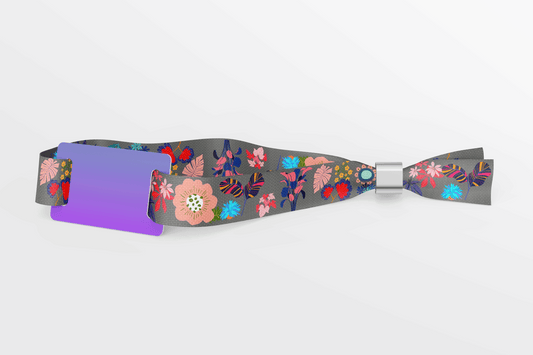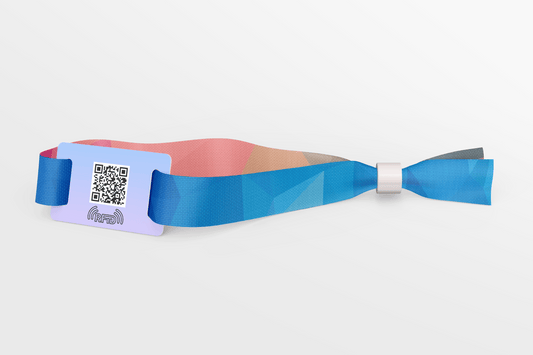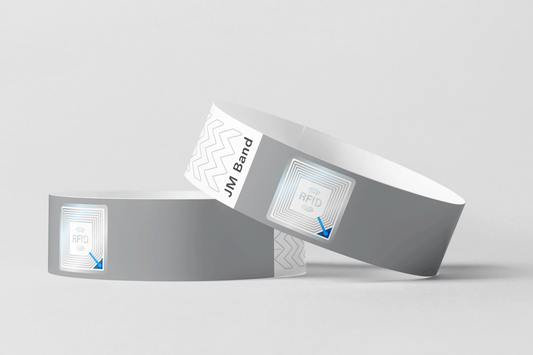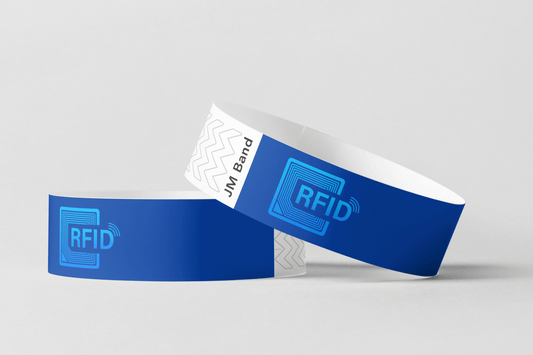Collection: RFID Wristbands
-
RFID Festival Wristbands - Inquire
Regular price €1,76Regular priceUnit price / per -
RFID and QR Fabric Wristbands with Colour Print
Regular price From €1,76Regular priceUnit price / per -
Silicone Wristbands with Advanced RFID
Regular price €1,76Regular priceUnit price / per -
RFID Silicone Wristbands with Fudan FM 1108
Regular price From €0,45Regular priceUnit price / per -
RFID Paper Wristbands - Inquire
Regular price From €0,70Regular priceUnit price / per -
RFID Paper Wristbands - Colour Print and Fudan FM 1108
Regular price From €0,65Regular priceUnit price / per -
RFID Paper Wristbands - Colour Print And Mifare UL EV1
Regular price From €0,67Regular priceUnit price / per -
RFID Vinyl Wristbands
Regular price €2,58Regular priceUnit price / per -
RFID textile bracelet with silicone slider
Regular price €9,99Regular priceUnit price / per -
RFID fabric wristband with leather slider
Regular price From €0,61Regular priceUnit price / per -
RFID Fabric Wristband with ABS Slider
Regular price €9,99Regular priceUnit price / per -
Bracelets with Button Lock and RFID
Regular price €9,99Regular priceUnit price / per -
Custom RFID Fabric Wristbands
Regular price €9,99Regular priceUnit price / per -
RFID Fabric Wristband with Coconut Slider
Regular price €9,99Regular priceUnit price / per -
RFID Silicone Wristbands with MiFare Ultralight EV1
Regular price From €0,47Regular priceUnit price / per -
Custom Thermal Wristbands
Regular price €9,99Regular priceUnit price / per -
MiFare UL EV1 Fabric Wristband in Stock
Regular price From €0,56Regular priceUnit price / per
Guide to Choosing RFID Wristbands for Your Event Needs
Knowing the different types of RFID wristbands is essential for event planners looking to boost efficiency and enhance the attendee experience. Woven and fabric wristbands are robust and secure, making them perfect for multi-day events. They provide protection against counterfeiting with their secure locking systems and offer excellent branding space for detailed graphics and logos. For single-day events, Tyvek and plastic wristbands are cost-effective and easy to use, ensuring swift check-ins and efficient access control, which is ideal for large-scale events.
Plastic RFID wristbands are often used for single-day music concerts due to their balance of security and affordability. These bands help manage high turnover efficiently by combining entry control with cost-effectiveness. Customizing wristbands enhances branding and visibility, allowing event organizers to effectively communicate messages and engage guests. With technologies like encrypted data storage, RFID wristbands provide a secure platform for tap-and-go experiences.
The appropriate RFID wristband choice hinges on the event's duration, security needs, and budget. Woven and fabric wristbands are excellent for high-security, customizable events, while plastic and Tyvek options offer budget-friendly advantages. For attendees seeking souvenirs, woven and fabric wristbands are both practical and memorable, serving as keepsakes from the event. For larger celebrations, wristbands designed for festivals offer both style and functionality.
Enhancing Event Security and Efficiency with RFID Wristbands
RFID wristbands play a pivotal role in advancing event security and operational efficiency by offering foolproof tools against fraud. Embedded with unique identifying chips containing encrypted data, these wristbands prevent unauthorized access and ticket counterfeit. This technology facilitates tiered access control, allowing customized user experiences from general admission to exclusive VIP access.
Real-world implementations of RFID systems show significant reductions in wait times and operational costs. For instance, large festivals report more streamlined check-ins and improved guest satisfaction due to the swift, secure nature of RFID transactions. Additionally, they offer crucial security features such as replacing lost wristbands without compromising security, ensuring smooth event operations.
RFID wristbands contribute to a cashless event environment, linking directly to attendees' payment systems for secure, contactless transactions. By tracking attendee movement data, organizers can swiftly address potential security issues, significantly enhancing safety and management of crowds.
Customizing RFID Wristbands to Boost Your Brand
Custom RFID wristbands provide unique opportunities for event planners to extend their branding efforts in engaging ways. By customizing with logos, colors, and designs, organizers can create a cohesive event identity that resonates with participants. High-quality printing technology allows for intricate branding on each wristband, turning them into effective marketing tools.
Case studies reveal the effectiveness of customized wristbands in engaging audiences, such as at music festivals where bracelets integrated branding and interactive technology, boosting social media interaction and enhancing attendee connection. Technology like NFC further personalizes experiences by directing attendees to branded content or exclusive features.
Customization also simplifies event management, differentiating various access levels seamlessly. Custom wristbands distinctively mark VIP attendees, adding exclusivity and improving guest management. Thus, customized RFID wristbands not only function as access tools but are integral to impactful branding strategies.
Insights into RFID Wristbands Manufacturing
An understanding of how RFID wristbands are manufactured can provide insight into their quality and functionality. They generally incorporate smart tags with an integrated circuit (IC) and antenna, which are produced separately then encapsulated within wristband material like silicone or PVC. Precision and reliability in IC production are ensured by using photolithography on silicon wafers.
The antenna, essential for communication with RFID readers, may be made through copper etching, screen-printing with conductive ink, or foil stamping. Post-assembly, rigorous quality checks, including encapsulation and testing, confirm product durability and functionality.
Transparent manufacturing processes are crucial for organizers focused on sustainability. Choosing RFID bracelets made using eco-friendly methods, like recycling materials and reducing energy usage, aligns with environmental goals, ensuring the benefits of cutting-edge technology without compromising ecological responsibility.
RFID Wristbands and Their Environmental Impact
RFID wristbands are increasingly developed with sustainability in mind, with materials such as Silicone Wristbands and Tyvek, known for their lower environmental footprint.
However, the environmental impact extends beyond materials to include the entire production process. In addition, some eco-conscious event organizers prefer Paper Wristbands as a sustainable alternative. Selecting manufacturers committed to eco-friendly practices—using recycled materials, renewable energy, and biodegradable components—can significantly lessen ecological impacts. These practices not only align with ethical considerations but also appeal to eco-conscious attendees.
Maximizing ROI with RFID Wristbands
The strategic use of RFID wristbands in events can yield substantial financial returns. Cost-effective options like Tyvek wristbands combine affordability with effective access control, making them ideal for large gatherings where budget considerations are crucial.
To maximize ROI, assess the event needs, including guest volume, duration, and security level. This evaluation guides the choice of wristband solutions that meet operational goals cost-effectively. Branding incorporated into the wristband design also enhances promotional value without extra marketing spend.
RFID wristbands enhance event management, reducing labor costs with faster check-ins and real-time data collection that informs future planning, boosting guest satisfaction and sustainable profitability.
RFID for Medical Use
Using wristbands to identify patients in hospitals is an age-old practice. Upon admission, a wristband is attached to patients and remains on their wrists until they are discharged. Initially, different colored wristbands were used, then wristbands with barcodes, and now the latest improvement is RFID wristbands for patients.
RFID wristbands in the medical sector are used to easily identify patients, store vital information about them, and have instant access to that information, as well as to determine their location. In healthcare, real-time data is a significant advantage, making quick decisions easier. Implementing RFID wristbands reduces the chance of human errors by avoiding paper lists and allowing information to be updated directly to a database.
RFID wristbands are ideal for triggering an alarm when patients attempt to exit through a door. This way, patients can feel like they are not locked in, but there is still control over their movements. This practice is particularly useful with patients suffering from dementia diseases like Alzheimer's.
Advancements in RFID Wristband Technology
RFID wristbands continue to evolve, promising greater innovation in security and efficiency. Integration with data analytics could offer deeper insights into attendee behavior, personalizing event experiences further.
Future developments might include interactive wristbands connecting attendees with digital content, augmented reality, or personalized offers, redefining the event experience through meaningful interactions.
The push for sustainability paired with technological advances may lead to even greener RFID wristband production. Staying updated with these innovations is vital for maintaining competitiveness and ensuring engaging, efficient, and eco-friendly events.
Choosing the RFID wristband chip
RFID wristbands should be comfortable to wear and not too bulky. While technology allows us to condense impressive features into a small RFID chip, the chip ultimately has weight, and the antenna requires dimensions many times the minimum for effective results.
We offer waterproof RFID wristbands made of Tyvek paper, vinyl plastic, textile fabric, and silicone rubber. Each has its own advantages as per the instructions.
- Tyvek paper RFID wristbands have an insert with metallic printing. These are disposable wristbands, very cost-effective, but not as durable.
- Plastic vinyl RFID wristbands are laminated, allowing for encapsulation of a chip within the laminated layers.
- Textile RFID wristbands can have a slider added or the chip embedded within two layers of fabric.
- Silicone RFID wristbands have the chip completely covered by silicone. The chip is inserted while the silicone is molded.
RFID chips are categorized by:
- Active or passive - internal power source.
- Frequency class - LF, HF, UHF.
- Memory capacity - in bytes.
- Communication protocol - coding and decoding standard.
- Tolerance - temperature, humidity, pressure.
- Manufacturer.
- 125 kHz and 134.3 kHz are classified as passive LF (Low Frequency) RFID IC chips - with a typical operating range of maximum 30 cm, approximately 10 cm for RFID wristbands with IC chips.
- 13.56 MHz is classified as passive HF (High Frequency) RFID IC chips - with a maximum operating range of around 1.5 meters, approximately 1 meter for RFID wristbands with IC chips.
- 860 - 960 MHz is classified as passive UHF (Ultra High Frequency) RFID IC chips - with an operating range of over 1.5 meters (with a minimum reading distance of over 1 meter).
RFID is a dynamic and rapidly growing industry. The range is constantly improving with a new generation of RFID chips entering the market.
- LF: Low Frequency - 125KHz.
- HF: High Frequency - 13.56MHz.
- UHF: Ultra High Frequency - 915MHz.
- Security and Prices
Security Regarding RFID Chip
RFID IC chips must be uniquely identified by an RFID reader to prevent unwanted manipulation or copying of information. Encoding is required to maintain security. Imagine a situation where an RFID wristband with an IC chip is unwantedly scanned, and the information on the chip is retrieved by insecure sources. It's not very difficult to mimic an RFID IC chip when the information on the chip is exposed, which can lead to misuse and damage.
It's important to understand how secure RFID wristbands are and what their weaknesses are before making a decision about using RFID.
Prices of RFID Chips
As technology advances in RFID chips for textile wristbands, they become more cost-effective and integrate into various types of wristbands.
There are original RFID IC chip manufacturers and compatible RFID IC chip manufacturers. Original RFID wristbands are often much more expensive than compatible ones. Our job is to present the advantages and costs to our customers and ensure that when we offer a solution with affordable, compatible RFID wristbands, they function properly despite the lower price.
Choosing RFID wristbands is more complex than it may seem. Let us help you find the best results.
Success Stories and Innovations with RFID Wristbands
Learning from successful implementations of RFID wristbands offers insight into their event management benefits. High-profile festivals like Coachella have effectively used RFID to manage crowds and enhance security, improving access and operational efficiency.
Feedback from event organizers highlights improvements in security, access management, and guest satisfaction, noting the convenience of cashless transactions and quick access. The technology also enables personalized attendee experiences based on profiles.
The triumphs of RFID wristbands demonstrate their versatility across event types, showcasing their operational execution benefits and guest satisfaction improvements. These examples provide confidence to potential buyers in adopting RFID solutions for their events.
FAQ
When choosing RFID wristbands, consider your event type, duration, and environment. Silicone RFID wristbands are ideal for long-term use and branding, fabric wristbands suit festivals and outdoor events, while plastic options are great for short-term or single-entry events. JM Band’s online design tool makes it easy to create wristbands that match your branding perfectly, and our team can guide you in selecting the best materials and chip types for your needs.
Custom RFID wristbands offer multiple benefits in hospitality, including faster check-ins, simplified access control, and contactless payments. They enhance guest convenience while reinforcing brand identity through customized designs. JM Band specializes in producing high-quality RFID wristbands that combine practicality and style, helping hotels, resorts, and venues deliver a premium and seamless guest experience.
Yes, RFID wristbands can be fully customized to reflect your event’s identity. You can choose from a range of colors, materials, and chip types, and add your logo or text. JM Band’s advanced 3D design preview ensures your wristbands perfectly align with your branding before production. This flexibility makes RFID wristbands ideal for corporate events, festivals, and hospitality venues.
JM Band offers express production and delivery across Europe, with RFID wristbands typically arriving within 1–3 business days. This ensures that even last-minute orders are fulfilled on time. Our efficient logistics and production setup mean you can rely on us for urgent event needs without compromising on quality or customization.



















